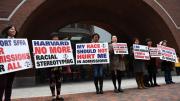The First Circuit Court of Appeals today upheld Harvard’s use of race in admissions, the latest ruling in a yearslong lawsuit alleging that the College’s admissions process discriminates against Asian-Americans. The case, first filed in 2014 by Students for Fair Admissions (SFFA), may ultimately be considered by the U.S. Supreme Court and could reverse or alter decades of precedent on affirmative action in college admissions.
The ruling upholds the October 2019 decision made by U.S. District Court judge Alison Burroughs. SFFA’s founder and president, affirmative-action opponent Edward Blum, quickly appealed that decision, and the First Circuit heard oral arguments in the appeal on September 16.
In their 100-plus-page decision, First Circuit judges Jeffrey Howard and Sandra Lynch wrote that Harvard’s use of race in admissions is consistent with Supreme Court precedent, rejecting SFFA’s claims that Harvard “(1) engages in racial balancing of its undergraduate class; (2) it impermissibly uses race as more than a ‘plus’ factor in admissions decisions; (3) it considers race in its process despite the existence of workable race-neutral alternatives; and (4) it intentionally discriminates against Asian American applicants to Harvard College.” The ruling concludes that there was no error in Burroughs’s decision, and that Harvard’s use of race is sufficiently narrow, appropriately tailored to meet Harvard’s goal of assembling a diverse class, and does not evince evidence of implicit bias against Asian Americans.
Blum vowed in response to appeal the First Circuit’s decision and take the case to the Supreme Court. Only that body can revisit the question of whether or not race can be used as a factor in admissions at all, or revise longstanding precedent that says that race can be used under certain circumstances. For a deeper look at the issues at stake in the case, listen to Harvard Magazine’s recent podcast episode featuring Jeannie Suk Gersen, Watson professor of law.
“Just over a year ago, U.S. District Judge Allison Burroughs found in Harvard’s favor,” said University president Lawrence Bacow in a statement. Today, her decision—and the values that underlie our undergraduate admissions process—are reaffirmed. The consideration of race, alongside many other factors, helps us achieve our goal of creating a student body that enriches the education of every student. Diversity also represents a pathway for excellence for both Harvard and the nation. We will continue to defend these principles and our admissions process all the way to the Supreme Court, if necessary.”
“Today’s decision once again finds that Harvard’s admissions policies are consistent with Supreme Court precedent, and lawfully and appropriately pursue Harvard’s efforts to create a diverse campus that promotes learning and encourages mutual respect and understanding in our community,” University spokeswoman Rachael Dane said in a statement. “As we have said time and time again, now is not the time to turn back the clock on diversity and opportunity.”
Blum and SFFA took a second case, against the University of North Carolina, to trial this past Monday. By proceeding against Harvard and UNC, Blum has cases under way against a public and a private institution, raising different constitutional and civil-rights issues, which may lead to separate Supreme Court challenges to affirmative action.








